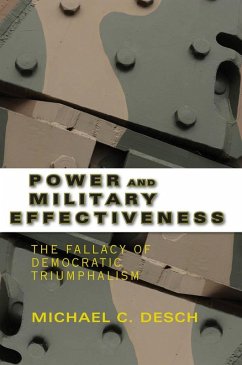
Limits of U.S. Military Capability (eBook, ePUB)
Lessons from Vietnam and Iraq

PAYBACK Punkte
14 °P sammeln!
Political scientist James H. Lebovic establishes that the size, strength, flexibility, and adaptability of the U.S. military cannot ensure victory in asymmetrical conflicts.In The Limits of U.S. Military Capability, Lebovic shows how political and psychological factors trumped U.S. military superiority in Vietnam and Iraq, where inappropriate strategies, low stakes, and unrealistic goals mired the United States military in protracted, no-win conflicts. Lebovic contends that the United States is at a particular disadvantage when fighting a counterinsurgency without the full support of the host ...
Political scientist James H. Lebovic establishes that the size, strength, flexibility, and adaptability of the U.S. military cannot ensure victory in asymmetrical conflicts.In The Limits of U.S. Military Capability, Lebovic shows how political and psychological factors trumped U.S. military superiority in Vietnam and Iraq, where inappropriate strategies, low stakes, and unrealistic goals mired the United States military in protracted, no-win conflicts. Lebovic contends that the United States is at a particular disadvantage when fighting a counterinsurgency without the full support of the host government; when leveraging various third parties (the adversary's foreign allies, societal leaders, and indigenous populations); when attempting to build coalitions and nations while involved in combat; and when sustaining government and public support at home when costs rise and benefits decline.Lebovic cautions against involving the U.S. military in operations without first considering U.S. stakes and suggests that the military take a less-is-more approach when choosing to employ force. Ambitious goals bring higher costs, unexpected results, diminished options, and a greater risk of failure. Rejecting the heavy-handed approach that is typical of most comparisons between the Vietnam and Iraq wars, The Limits of U.S. Military Capability carefully assesses evidence to develop lessons applicable to other conflicts-especially the ongoing war in Afghanistan.
Dieser Download kann aus rechtlichen Gründen nur mit Rechnungsadresse in A, B, BG, CY, CZ, D, DK, EW, E, FIN, F, GR, HR, H, IRL, I, LT, L, LR, M, NL, PL, P, R, S, SLO, SK ausgeliefert werden.













